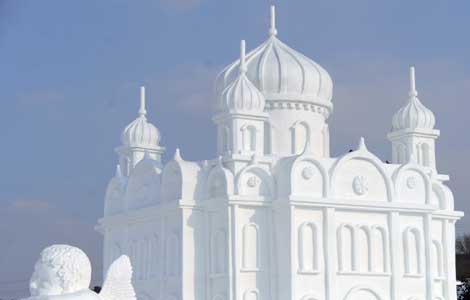Doubt voiced on Tokyo's diplomatic push
Updated: 2014-01-16 01:08
By ZHANG YUNBI in Beijing and CAI HONG in Tokyo (China Daily)
|
||||||||
Japan will send more officials to the US in attempt to defend Abe's shrine visit
A global diplomatic campaign launched by Tokyo to justify Japanese Prime Minister Shinzo Abe's visit to the Yasukuni Shrine is likely to worsen ties with neighboring countries, according to analysts.
Shotaro Yachi, director of Japan's National Security Council's Secretariat, will visit the US from Friday to heal a rift in the US-Japan alliance and to justify Abe's Dec 26 visit to the shrine, which honors 14 Class-A convicted war criminals, Japan's Jiji news agency reported.
Yachi will leave for Washington on the day that Nobuo Kishi, Abe's younger brother and Japanese vice-foreign minister, completes his five-day US tour.
Kishi planned to meet with US Deputy Secretary of State William Burns on Wednesday, with Washington saying that Burns would reiterate the US stance on Abe's visit.
Marie Harf, deputy spokeswoman for the US State Department, told reporters on Tuesday, "We believe good relations among Japan and its neighbors benefit everyone in the region, are in the interests of them and certainly the interests of the US as well."
A group of Japanese lawmakers, headed by former foreign minister Hirofumi Nakasone, has ended a US trip to defend Abe's visit to the shrine.
The US said earlier it is disappointed by the visit.
Shi Yinhong, a professor of US studies at Renmin University of China, said the US-Japan alliance will surely overcome the rift caused by the shrine visit, but Tokyo's diplomatic initiative appears unlikely to mend ties with its neighbors.
"What the US worries more about is whether Japan's radical right-wing trend will undermine the US-South Korea alliance and the US' rebalancing strategy in the Asia-Pacific region," Shi said.
Yoshiie Yoda, professor emeritus at Japan's Waseda University, said: "Abe chose an inappropriate place, although he said he visited Yasukuni to pray for peace. Abe's visit to Yasukuni, which enshrines 14 Class-A war criminals, is a political issue."
Yachi, as a top foreign affairs and security policy adviser to Abe, will focus on strengthening the US-Japan alliance before flying to meet his counterparts in Britain, France, Germany and Belgium.
Wang Dong, director of the Center for Northeast Asian Strategic Studies at Peking University, said Yachi will repeat the jargon of Abe's explanation for the shrine visit.
Abe said the visit was to promise "no war" and was not aimed at offending China and South Korea.
Wang said, "Tokyo is acting out of a huge fear of a potential cancellation of US President Barack Obama's upcoming visit to Japan in April."
Other commentators have said that Abe's mission is unlikely to improve Japan's ties with neighboring countries.
Tokyo has not delivered any public apology or voiced regret over the shrine visit, which has been viewed widely by Japan's neighbors as honoring the symbol of the country's past militarism.
Beijing on Wednesday said Tokyo had turned a blind eye to the serious harm caused by the shrine visit to the feelings of people in victimized countries.
Foreign Ministry spokesman Hong Lei said, "Abe, by his actions, has defied the spirits of the Murayama Statement and Kono Statement, and Japan will not bluff the international community by saying one thing and doing another on historical issues."
The two statements of apology, made by former Japanese prime minister Tomoiichi Murayama in 1995 and former chief cabinet secretary Yohei Kono in 1993, reflected on Japan's wartime behavior.
Jia Xiudong, a researcher at the China Institute of International Studies, said Abe's plan to honor dead Japanese soldiers later this year when he visits Pacific island countries will "backfire".
"The Japanese Cabinet has only one way to get out of this trouble — admit Abe's mistake and apologize," Jia said.
Contact the writers at zhangyunbi@
chinadaily.com.cn and caihong@chinadaily.com.cn
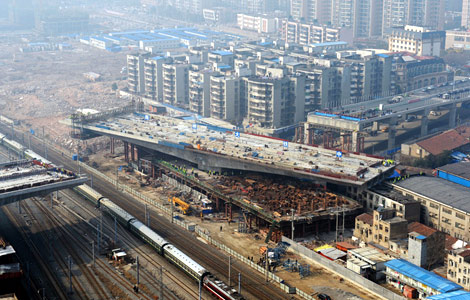
 Wuhan overpass swings into place
Wuhan overpass swings into place
 Detroit auto show features fuel-efficient cars
Detroit auto show features fuel-efficient cars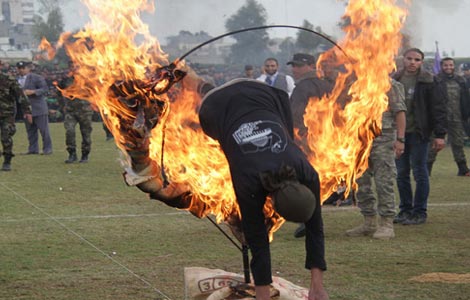
 Palestinian students show military skills
Palestinian students show military skills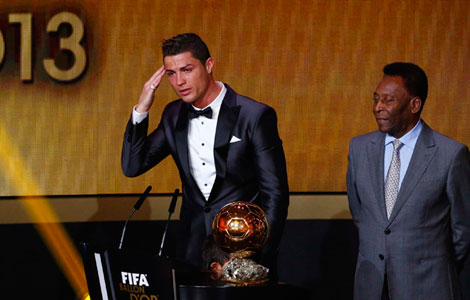
 Cristiano Ronaldo wins FIFA best player award
Cristiano Ronaldo wins FIFA best player award
 Xuelong carries on mission after breaking from floes
Xuelong carries on mission after breaking from floes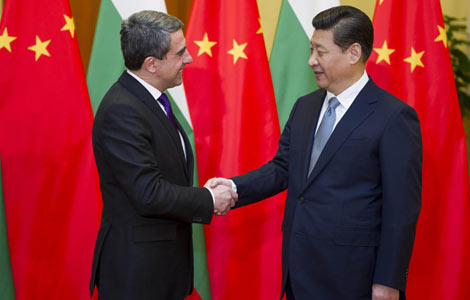
 Beijing and Sofia vow new initiatives
Beijing and Sofia vow new initiatives
 71st Golden Globe Awards
71st Golden Globe Awards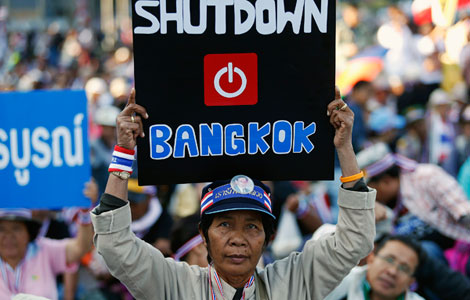
 Bangkok unrest hurts major projects and tourism industry
Bangkok unrest hurts major projects and tourism industry
Most Viewed
Editor's Picks

|
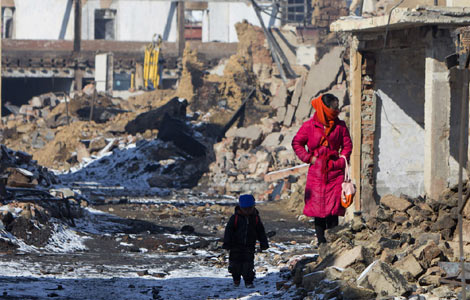
|

|

|

|
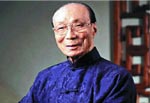
|
Today's Top News
China seeks to calm US fears over missile
Doubt on Tokyo's diplomatic push
China Mobile and Apple 'tie the knot'
Russia battles terror before Olympics
China vows reform to curb corruption
Corrupt officials beware this New Year
Shanghai schools to close on heavily polluted days
Air China ups Houston-Beijing service to daily
US Weekly

|

|


